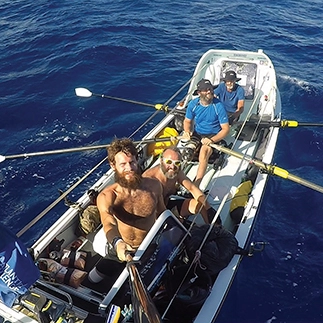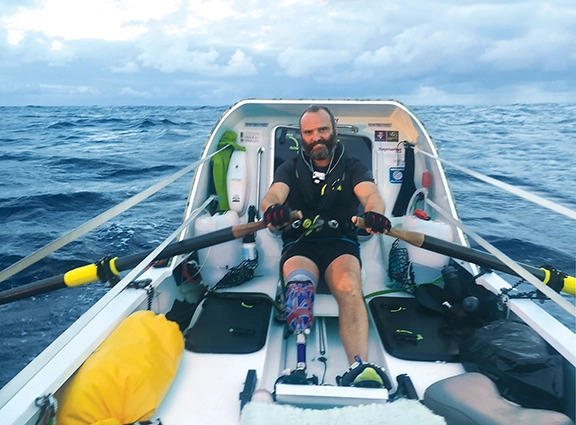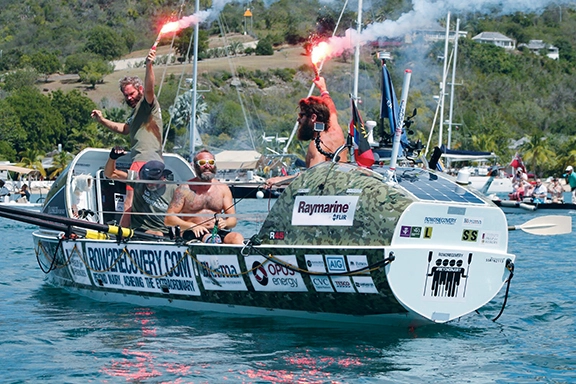By Elizabeth Bokfi

While consistent exercise is commonly recognized as an important factor in maintaining physical fitness and mobility, its mental health benefits should not be overlooked. For amputees who have experienced the negative impact on their self-image that limb loss can trigger, being able to complete a physical task can provide a needed sense of accomplishment. Also, in addition to helping maintain the muscle strength vital to using a prosthesis, exercise can flood the brain with feel-good hormones that help improve individuals’ sense of well-being.
Recognizing the relationship between physical fitness and healing from the physical and emotional scars of war, Row2Recovery, an adaptive rowing charity in the United Kingdom, promotes recovery for injured and sick veterans and service members through the sport of rowing.
A chance conversation across beds at a rehabilitation center started the ball rolling a year before British military veterans Lee Spencer, Cayle Royce, Nigel Rogoff, and Paddy Gallagher were put together by Row2Recovery as a crew for a transatlantic row, the 2015/16 Talisker™ Whisky Atlantic Challenge. Although this was Row2Recovery’s third transatlantic row involving amputees, it would be their first featuring an all-amputee crew. Having lost his right leg below the knee after being hit by a vehicle while at the scene of an accident, Spencer, a Royal Marine colour sergeant, recalls how it all began.
“Shortly after becoming an amputee, I had an admission to Headley Court [Defence Medical Rehabilitation Centre]. Cayle was in the bed opposite me. He had just gotten back from rowing the Atlantic and I was enthused with his story. About a year later, I got an email asking for volunteers to put together another crew. This time it was an all-amputee crew. So I jumped at the chance and replied to his email.”
Naming themselves Row2Recovery after their rowing charity, the four amputees, with a combined total of three legs, began training for their epic adventure of self-awareness and inspiration—a grueling 3,000-nautical-mile rowing expedition across the Atlantic Ocean.
“I had to complete their…race courses that are mandatory,” says Spencer. “[This took] a couple of weeks. Personal prep involved a lot of heavy weight training to put on weight and a lot of rowing on an ergo rowing machine.”

Images courtesy of Row2Recovery.
It is estimated that rowers lose approximately 20 percent of their body weight by the time they complete the race. Preparation for the Atlantic Challenge involved not only the fitness aspect of bulking up, including cardiovascular endurance, but also the mental component. Known as the world’s toughest row, it tests the mental and physical limits of all who participate. Weeks of extreme isolation, confined space, gargantuan ocean waves, seasickness, and sunburn test the grit of every crew member.
Each team enters the water equipped with safety and medical equipment and 90 days’ worth of cooking gas and food. Should they need to ask for more, they are automatically disqualified. The rowboats are specially designed vessels that come outfitted with ocean-to-drinking water converters, satellite telephones, and high-tech GPS devices that allow them to be tracked and to communicate with passing vessels. With only a small cabin, the boats are designed to upright themselves should they capsize. They are powered only by the rowing team, the wind, and the ocean’s natural currents.
On December 20, 2015, Team Row2Recovery left La Gomera, Canary Islands, aboard their vessel named Legless. Headed for English Bay, Antigua, the wounded military vets would go on to complete the physically demanding challenge in 46 days, 6 hours, and 49 minutes.
Enduring extreme conditions with the added challenges of being amputees cemented Team Row2Recovery’s message, not just to other amputees and military personnel but to themselves—that there is life beyond injury. Two hours on and two hours off, they took turns rowing Legless, riding their own personal waves, testing their mental and physical boundaries to the extreme.

Aside from skin breakdown, blistering, and phantom pain, conditions familiar to amputees, there were other aspects of the row that also differentiated their experience from that of the able-bodied teams.
“Seventy percent of the power comes from your legs for the rowing, but obviously we only had three legs between the four of us on the boat. What was more challenging was getting around the boat—mobility [and] doing day-to-day tasks that needed to be done, like switching the water maker,”
explains Spencer. “The amount of energy required to do menial tasks—ordinary things that others take for granted. There was awkwardness aboard the boat to do the switchovers, to get up and maneuver around. It took 10-15 minutes just to change rowing positions. Cayle’s a double amputee. His rowing position was a fixed one, so when he had to switch with Patrick, changing his seat from one that is static to one that moves backwards and forward took time. An able-bodied crew are able to switch rowers fairly efficiently and quickly. So all the time that it’s taking to swap, we are not rowing. It might seem just a few minutes each time, but over 46 days you’re adding up to four or five days to your row.”
Spencer says his worst day was the first one, and his best day was the last one as the team focused on rowing in. But in between, he felt that there were those days where chance was on his side, such as the day when a near-overboard fall shattered the socket of his prosthesis.
“In trying to prevent myself from falling overboard, I fell onto the edge and my socket got entangled and shattered. I went one way, and my [prosthetic] leg went the other and just broke.” Spencer explains the positive aspect of his fall. “If it was my actual leg that had happened to, it would have broken and that would have been the end of my row.” Despite difficulties, Spencer struggles to find any true negatives.
“I am still a Royal Marines commando,” he continues. “Someone who defines [himself] in terms of physicality. I’ve been a soldier, served in Iraq and three tours in Afghanistan. The person I thought I was changed instantly when I lost my leg. Personally, [the Challenge] was about redefining who I am in terms of physicality—what I can do physically.”
Having reveled in the entire expedition following those initial hurdles, Spencer is clear about the positives.
“For anyone considering challenges coming their way, grab it. Grab it with both hands, because one opportunity leads onto another, and these opportunities for me were about ensuring that people don’t define who you are. Others do not define who you are by what you cannot do; my disability does not define me. I will not allow it to define me.”
FOR MORE INFORMATION
Blesma, The Limbless Veterans
www.blesma.org
Endeavour Fund
www.endeavourfund.co.uk
Help for Heroes
www.helpforheroes.org.uk
Row2Recovery
www.row2recovery.com
Talisker Whisky Atlantic Challenge
www.taliskerwhiskyatlanticchallenge.com



